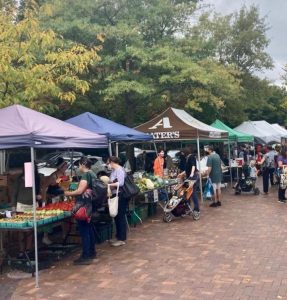
Anyone who resides in or around Washington, DC knows that there is an abundance of activities to partake in. Almost every weekend there is a new exhibit featured in a museum, trendy bars and restaurants that claim to have the best happy hour, and newly developed areas of the city to explore. With all of these activities to pass the time away, it is easy for us to neglect our bodies, the environment, or both.
Luckily, DC welcomes a sustainable lifestyle with open arms! Many restaurants offer vegetarian alternatives, local vendors make an appearance at farmers markets every weekend, and if you’re lucky enough, you might have an outdoor area to garden in!
If you are looking to take steps towards helping the environment around the nation’s capital while bettering the quality of your personal life, consider implementing one or more of the following:
Lower Your Meat Intake
While there are no livestock farms in DC, Virginia and Maryland are home to many farms that raise cattle, chickens, and other animals raised primarily for consumption.
According to the United States Department of Agriculture’s 2020 overview, there were 42,300 farms operating in Virginia on 7,800,000 acres. On these farms, 585,000 cows were raised for their beef.
On the opposite side of DC, Maryland was operating 12,400 farms throughout 2020, as shown by the USDA. While the cattle inventory is lower in Maryland, chickens are the primary income for farmers. The inventory for chickens evened out to 287,300,000.
Livestock farms around Washington, DC pose a major threat to the environment. The production efforts have a substantial impact on climate change due to emissions of greenhouse gases. Research shows that cattle alone account for 7-18% of global methane emissions.
Factoring other livestock into this number causes the percentage to increase significantly. Citizens of the States eat three times more meat than the global average which supports the theory that eating a plant-based diet would likely reduce food-related greenhouse gases by up to 73%.
Relating this issue back to DC, many restaurants in the nation’s capitol seem to have acknowledged that citizens are making an effort to eat more of a plant-based diet. A select amount offers meat substitutions in addition to an entirely plant-based menu. A few of my favorite vegetarian and/or vegan restaurants to eat at are Beefsteak, Busboys and Poets, Fancy Radish, and HipCityVeg. There are many others that you can check out here!
Eat Local
Which farmers markets have you gotten the chance to visit in your neighborhood? Even in the busiest cities, farmers markets are usually held on the weekends and feature local produce, baked goods, and other products that are sure to please your palette.
Benefits from buying at farmers markets include, but are not limited to, supporting local businesses to stimulate the economy, indulging in the freshest produce available, protecting the earth by cutting back emissions that are released while transporting produce to large stores, and trying new, exciting foods that might be out of your comfort zone.

Surfrider DC hosts joint events with Mt. Pleasant Farmers Market, but if the Mt. Pleasant neighborhood is a bit out of the way for your liking, you can find one closer to home here. What are you waiting for? Take a trip to your local farmers market next weekend!
Plant Your Seeds and Eat Them Too
You don’t have to be a farmer to visit the farmers market, but if you’re interested, you can become your own version of a farmer by purchasing seeds or produce that can be repurposed! Maintaining a garden, large or small, saves money and is sustainable.
Gardening improves the air and soil quality. As mentioned in U.S. Green Technology, plants produce oxygen through the process of photosynthesis. Carbon dioxide, chemicals, bacteria, and harmful elements are absorbed by plants and are then filtered into useful waste products like oxygen and water, both necessary in congested cityscapes such as DC.
The Surfrider DC Chapter is planning on participating in a seed swapping event during the month of February. Through this event, members from Surfrider DC, Slow Food DC, Very Sad Lab, Mt. Pleasant Compost, and Mt. Pleasant Library Friends will have opportunity to grow their home garden and help the environment, all by swapping seeds!
